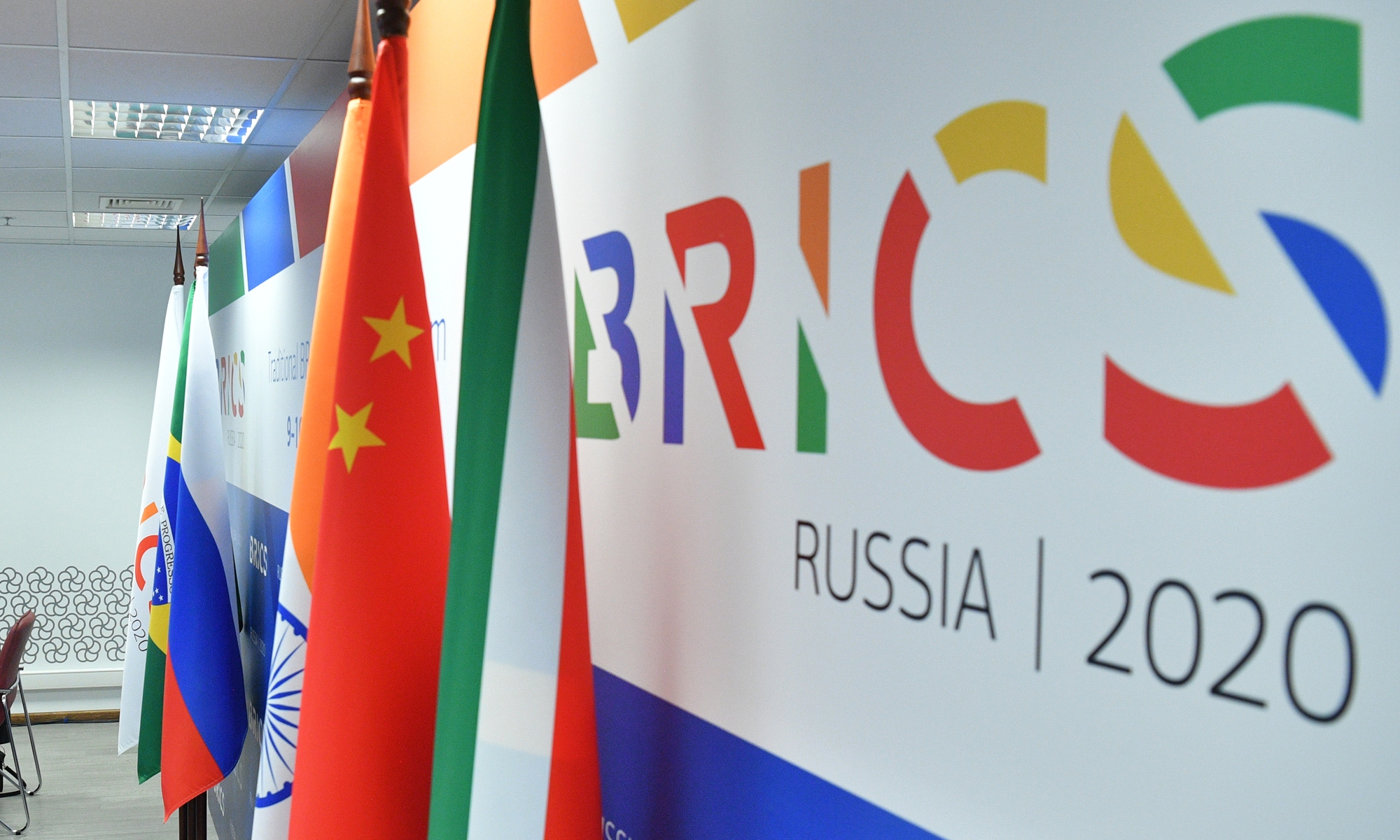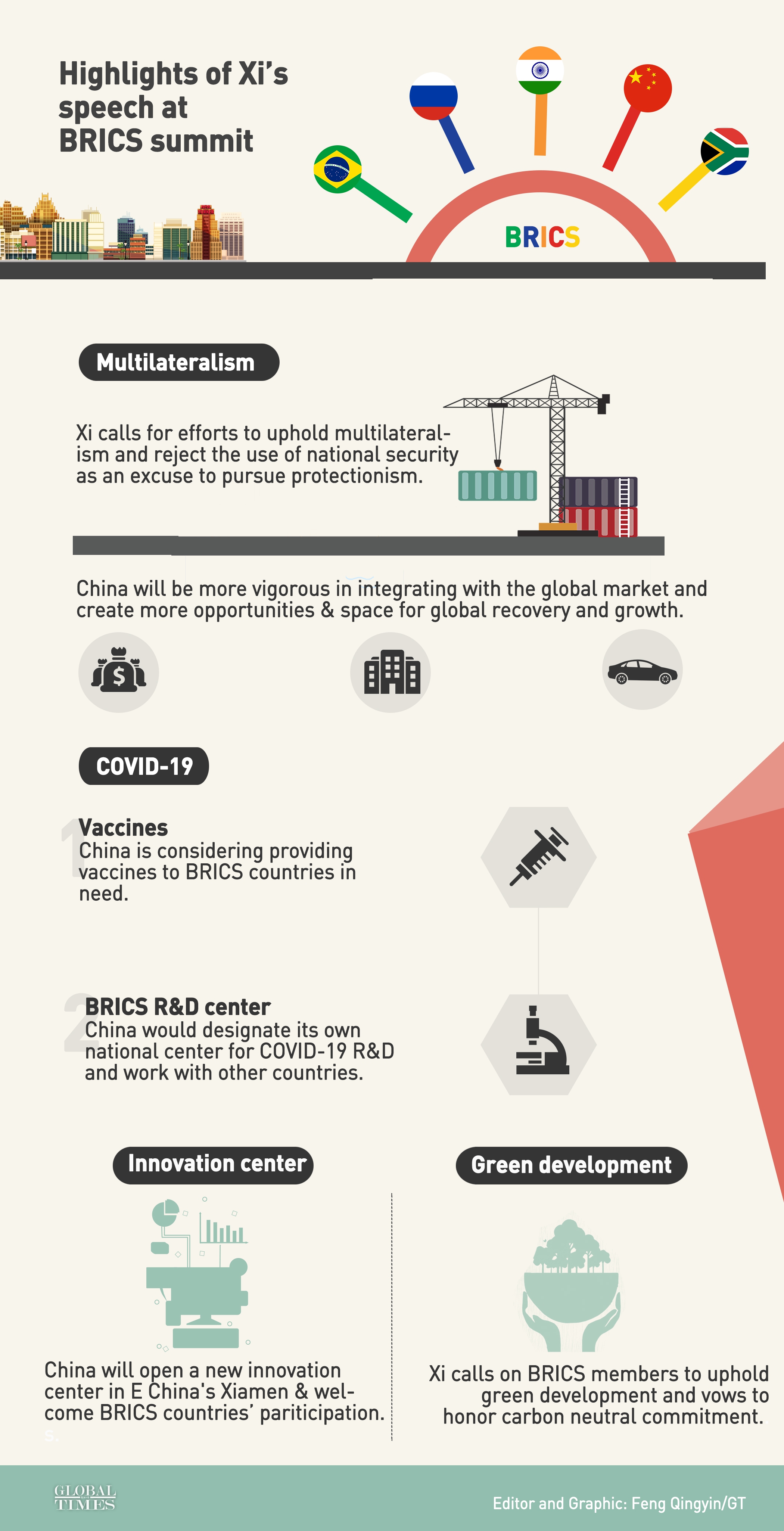
BRICS Photo: brics-russia2020.ru
Leaders from the world's five biggest emerging economies on Tuesday agreed to jointly tackle a wide range of issues, from public health to security to economic recovery, as they finalized several key initiatives at a virtual summit, issuing a clear rejection to growing unilateralism and economic protectionism, and sending a resounding signal that the emerging powers are strengthening ties despite exisiting disputes and risks.
Coming on the heels of signing the world's biggest free trade agreement by Asia-Pacific economies and ahead of several key global summits, the virtual summit of the BRICS - Brazil, Russia, India, China and South Africa - injected fresh momentum for multilateralism against a rising tide of unilateralism, and accentuated what is said to be the busiest season for China's diplomatic engagement that puts in full display the country's growing leadership role in pushing for regional and global cooperation.
In his speech at the virtual summit, Chinese President Xi Jinping called for efforts to uphold the global multilateral system, protect economic globalization and reject the use of national security as an excuse to pursue protectionism, warning that economic decoupling only hurts shared interests of all countries. Chinese officials and experts have criticized the US for economic bullying and protectionism.
Cooperation over disputes
At the virtual summit hosted by Russian President Vladimir Putin, the leaders called for strengthening intra-BRICS cooperation in a flurry of areas, including joint efforts to combat the COVID-19 pandemic, speed up research and development and mass production of vaccines for the COVID-19, and better coordinate policies to promote economic recovery from the global pandemic.
Among the key takeaways from the virtual summit was the adoption of the BRICS Economic Partnership Strategy through 2025, which determines the medium-term priorities for the development of BRICS interaction in trade, investment, finance, assistance to micro, small and medium enterprises, digital economy and innovation, and sustainable development.
In the area of security, the leaders also endorsed the BRICS counterterrorism strategy, which would call for cooperation among member countries to take joint action to prevent terrorist activities. On public health, the leaders also called for the establishment of an early-warning system for infectious diseases, in addition to other measures for the COVID-19.
The meeting of BRICS, which represents about 42 percent of the population and 23 percent of the world's GDP, comes at a critical time of profound challenges posed by the COVID-19 both within the bloc and globally.
While China has effectively reined in the COVID-19 pandemic, other members of the bloc still face severe outbreaks of the virus, with India and Brazil seeing some of the world's largest number of cases. Economically, China is the only BRICS member predicted to post positive GDP growth this year with a 1.9 percent expansion, compared to an estimated 10.3 percent contraction for India and 8 percent for South Africa, according to the IMF. Geopolitically, foreign media outlets have also been hyping border tensions between China and India as a shadow for cooperation.
Addressing the BRICS summit for a seventh consecutive year, Xi urged BRICS countries to overcome division with unity, replace bias with reason and stamp out the "political virus," noting politicization, stigmatization, blame-shifting and scapegoating only serve to disrupt overall global cooperation against the virus.
Warning against using the pandemic to pursue "de-globalization" or clamoring for "economic decoupling" and "parallel systems" will end up hurting one's interests and the common interests of all, the Chinese president also called for efforts to uphold the global multilateral system and reject abusing the "national security" concept for protectionist purposes.
The US, under President Donald Trump's "America First" agenda, has long been criticized for pursuing protectionist economic and trade policies, bullying trade partners with tariffs and unilateral sanctions, and stirring up geopolitical tensions across the world.
In a declaration issued after the virtual summit, the BRICS leaders also reaffirmed "our commitment to multilateralism and the principles of mutual respect, sovereign equality, democracy, inclusiveness, and strengthened collaboration," and called on all WTO members to avoid unilateral and protectionist measures.
Impetus for multilateralism
That unmistakable voice of support for the global multilateral system and rejection to unilateralism from the BRICS virtual summit on Tuesday echoed a powerful similar tone just two days earlier, when China and 14 other Asia Pacific countries on Sunday officially signed the Regional Comprehensive Economic Partnership (RCEP), said to be the world's biggest trade block so far.
Those sentiments are also expected to be reiterated through a series of upcoming occasions in what has been described as the busiest period of Chinese diplomacy in recent and upcoming global events that are expected to inject much-needed momentum for multilateralism.
After the BRICS summit, Xi will also attend the 27th Asia-Pacific Economic Cooperation (APEC) Economic Leaders' Meeting, which is scheduled on Friday, and the 15th Group of 20 (G20) summit, which will kick off Saturday.
Media attention would be on US leaders' attendance to the summits and the shifting dynamics of leadership at the multilateral events, after Washington was left out of the biggest trade pact in the region, while Beijing has been taking center stage in both regional and global platforms, including the signing of the RCEP, Chinese experts noted on Tuesday.
"China is on its way to emerging from the pandemic-induced economic crisis and will continue to be the most important driver for regional and global economic growth," Wang Yiwei, director of the institute of international affairs at Renmin University of China, told the Global Times, stressing that China's leading role within the BRICS and beyond.
In a clear signal of China's commitment to promoting international cooperation, Xi said during his speech on Tuesday that "China will not shut its door of opening-up; it will embrace the world with more open arms. China will be more vigorous in integrating with the global market and will take greater initiatives in deepening international cooperation."
The series of summits will also cement the leading role of not just China but also Asia-Pacific countries and emerging markets in bolstering global economic growth, as well as upholding the momentum of multilateralism, Chinese experts noted on Tuesday.
In a sign of a unified stance on multilateralism at the upcoming events, BRICS leaders on Tuesday also exchanged views and notes on the relevant regional and global issues for the upcoming G20 summit, aiming to advance in the G20 the interests and priorities of emerging market economies and developing countries, according to the declaration.
The call for support to multilateralism from BRICS countries and others showed that the tendency for multilateralism and globalization remains unchanged, despite certain countries' stepping back, Bai Ming, deputy director of the Ministry of Commerce's International Market Research Institute, told the Global Times.
"Some countries are promoting unilateralism and protectionism, claiming that their domestic interests have been damaged during globalization. However, their selfish behavior will hurt the global economy and themselves," Bai said in reference to the US.

Infographic: GT
